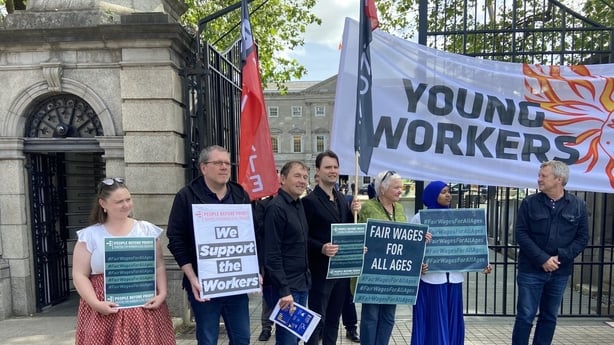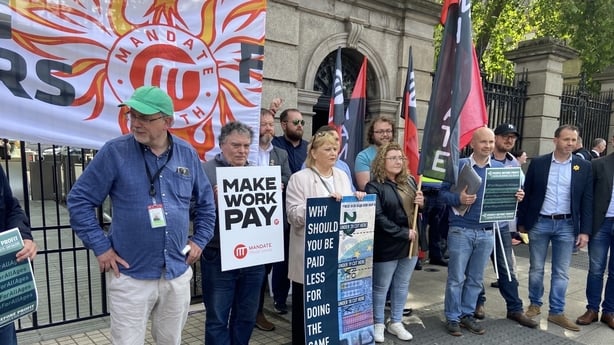A protest has taken place outside Leinster House calling for the abolition of sub-minimum wage rates.
Around 20 people holding placards took part in the lunchtime demonstration, which was organised by the Mandate trade union and was supported by People Before Profit-Solidarity.
The current national minimum wage is €12.70 per hour.
However, the minimum wage for those aged 19 is €11.43, 90% of the prevailing rate; for those aged 18 it is 80% or €10.16; and for those aged 17 and under it is 70% or €8.89 per hour.

Mandate said the mechanism creates unfair, unequal and discriminatory treatment and exploitation of young workers.
"These young workers are tasked with the same duties as their comparable employees so there is no rationale for these rates of pay," said Greg Caffrey, Mandate Divisional Organiser.
"One can only conclude the rationale for this is to make exploitation and discrimination of young workers legal within the Irish State, which we define as an unacceptable practice which should be ended with immediate effect," Mr Caffrey added.
The union will hold a demonstration outside Leinster House calling for the scrapping of sub-minimum wage rates.

Last week, the Low Pay Commission recommended the abolition of all sub-minimum rates of pay for all employees.
Minister for Enterprise, Trade and Employment, Peter Burke said his department will now commission an economic impact assessment and seek legal advice on the Low Pay Commission's recommendations.
"A Government decision on the Low Pay Commission’s recommendations will then be made in due course," Mr Burke said.
"In doing so we will have recourse to the SME test which is a key element of my 15-point business supports package announced last month," he added.
Business groups, however, have pointed out that employers in the retail and hospitality sector are not allowed to employ young people to sell age-restricted products such as alcohol, tobacco and vaping products.
"There are also very significant restrictions contained in the Protection of Young Persons Act regarding the amount of hours they are permitted to work and the amount of rest time they must be given is at variance to adult workers," said Vincent Jennings, CEO of the Convenience Stores and Newsagents Association (CSNA).
"The Equal Status Act specifically provides for the different wage treatment based on age."
"Employers would be much less inclined to hire young people at the same rate as adults when they can't carry out the same functions or have the same availability," he added.
Additional reporting Brian O'Donovan






